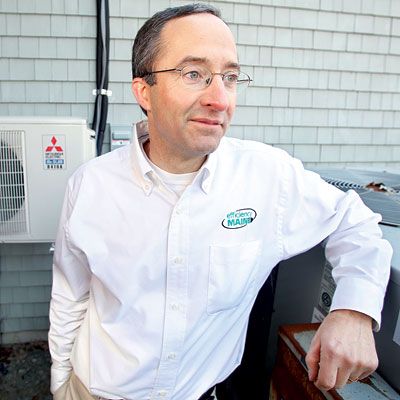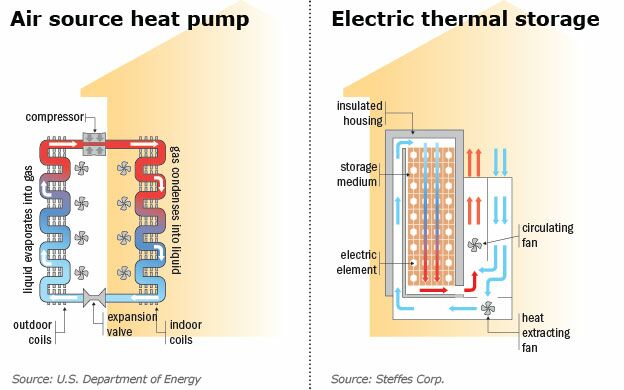Rebate programs inspire new look at electric heat
Gerry Chasse, president and chief operating officer of Bangor Hydro-Electric Co. and Maine Public Service, has a personal and keen business interest in the three electric heat pumps newly installed in his home.
Like more than 75% of Maine households, Chasse has relied on oil to heat his home. But in recent years he's become increasingly frustrated by its steadily rising cost. With the Governor's Energy Office pegging the average statewide cost of No. 2 fuel oil at $3.74 per gallon, he figures his oil-heating outlay this winter would have been in line with the more than $4,000 he paid last year.
But with the electric heat pumps relegating his oil furnace to back-up status for only the coldest days, he expects to be paying a little more than $1,500 to heat his home this season.
“There's absolutely no question in my mind they work,” Chasse says of the heat pumps he expects will provide 80% to 90% percent of his home's heat this winter at less than half the cost of oil.
His business interest?
Bangor Hydro and its sister company Maine Public Service are offering a pilot program with rebates and on-bill financing to encourage up to 330 electricity customers in northern Maine to give electric heat a closer look — specifically, the new electric heat pump technology that claims 60% yearly energy savings compared to oil and is able to perform in cold climates in temperatures as low as -15 degrees Fahrenheit. With the heating season half over, two-thirds of those rebates are spoken for.
In the southern half of the state, Central Maine Power Co. has its own pilot program for up to 500 qualifying customers — but it's encouraging the adoption of an entirely different electric heat technology known as thermal energy storage, which taps cheaper off-peak power to heat ceramic bricks that disperse their warmth slowly throughout the day. The manufacturer pegs the energy savings of thermal energy storage at $800 or more a year for the typical home, compared to heating with oil.
Both utilities hope the rebates will encourage homeowners and businesses to reconsider long-standing negative stereotypes about electric heat's high cost. The idea is to jump-start a market and then wait for word-of-mouth advertising to kick in as customers realize savings on their energy bills.
As Chasse sees it: “Electricity can be the work-horse of meeting your heating needs. If you go back 10 years and look at the curves for oil and electricity, electricity's cost is lower now than it was 10 years ago while the price of oil has tripled.”
Business opportunities
Adam Cote, a former energy attorney at Pierce Atwood LLP in Portland, where he was a member of the firm's renewable energy practice group, is putting his money on electric thermal storage — literally.
In 2008, he co-founded Thermal Energy Storage of Maine LLC, a Biddeford-based company that is the New England distributor of the Steffes Corp. thermal storage units supported by the CMP rebate program.
After exploring wood pellet systems, electric heat pumps, photovoltaic and other solar energy options, Cote says he and his business partners settled on electric thermal storage as the best affordable and low-maintenance alternative to oil. Besides offering smaller room-sized heaters that can supplement another heating source, he says, the larger furnace units are readily adaptable to forced-air or hot-water ductwork within homes or businesses now using oil.
“What we like about electric thermal storage is that there are about nine or 10 different sizes, from small to large, that make it a very flexible option,” he says. “If you don't want to do a large capital investment [i.e., to install a central heating system] you can get a larger room unit. There's no venting requirement … It's like a Rinnai. You can put them anywhere to use as a source of heat and even one unit will cut your oil usage significantly.”
Cote says room units range in price from $3,000 to $3,900 fully installed depending on size, with the CMP pilot program offering $1,500 rebates apiece for up to three units. A central heating unit can run between $10,000 to $12,000, and is eligible for a $4,500 rebate.
Besides the obvious boost from CMP's pilot program, Cote says his company has gained another key ally in Dead River Co., a statewide oil dealer that announced last fall it was diversifying into the electricity supply business. He says Dead River signed on as an installer of Steffes thermal storage units and sees them both as a cost-saving alternative to oil, as well as a vehicle to gain customers for its fledgling electricity supply business.
“We view Dead River as the 'L.L.Bean' of home heating,” Cote says of that strategic marketing alliance.
“The business owners participating in Bangor Hydro's pilot program are very positive about the ductless, mini-split heat pumps,” says Andy Meyer, residential program manager for Efficiency Maine, an Augusta-based agency that administers energy efficiency and alternative energy programs throughout the state. “They truly are an innovative technology.”
Meyer says the new electric heat pump technology offered through the pilot program is rated to work in cold temperatures and will have an EnergyStar label, assuring purchasers the units have a “heating season performance factor” exceeding comparable products.
“The ductless mini-split heat pumps are up to 350% efficient,” Meyer says, meaning that for every unit of electricity used to power them they put out more than three times that energy input as heat. By comparison, a typical oil furnace delivers heat at 70% to 80% efficiency.
“Other than solar energy, there is nothing like this in terms of energy efficiency,” he says.
Paul Badeau, director of communications for Efficiency Maine, says the agency's $150,000 innovation grant partially funds the Bangor region utilities' pilot program and is intended to encourage “new ways of delivering cost-effective measures that will offer sizeable energy savings.”
Market will decide
As Gov. Paul LePage pointed out in his Feb. 5 State of the State address, Maine's electricity and energy costs exceed national averages and place a heavy burden on both households and businesses.
Bangor Hydro's Chasse says new electric heat technologies like mini-split heat pumps can help Maine's economy on both fronts:
- They lower heating costs and will help reduce the state's highest-in-the-nation dependency on oil.
- The additional kilowatt hours used to power electric heat increases revenues for electric utilities, which helps them offset inflationary costs without hiking rates. And if the increased revenues exceed the fixed costs of the utility's transmission and delivery system, the savings can be passed on to ratepayers in the form of lower electricity rates.
“This, to me, it's a win on all fronts,” Chasse says, noting that an additional benefit is that half of Maine's electricity comes from renewable sources, giving electric heat a much smaller carbon footprint than oil and other fossil fuels.
Adam Cutter, CMP's marketing program manager who's overseeing the utility's pilot program, says Steffes' electric thermal storage technology likewise offers a cheaper alternative to oil heat and an opportunity for higher revenues resulting from greater electricity usage. An important added benefit, he says, is that all that electricity usage takes place at night, when demand is low and electric rates are a fraction of the peak price.
Cutter says electric thermal storage — by drawing more electricity at non-peak hours and adding to overall revenues, albeit at off-peak prices — improves the cost-efficiency of maintaining the CMP transmission grid.
“You're not increasing fixed costs, and you're increasing sales,” he says. “One of the reasons we wanted to look at electric thermal storage is because it uses off-peak power.”
Cutter says roughly 100 people have signed up for the CMP pilot program so far, but noted the program didn't get rolling until the heating season had already begun. In Bangor Hydro's program, 156 rebates have been granted, 94 are pending and 80 remain available.
Those enrollees are a fraction of CMP's 560,000 customers, Bangor Hydro's 117,000 and Maine Public Service's 36,000. But Cote says shifts in energy usage, like any emerging technology, take time to gain momentum before they have an impact. He cites Nova Scotia as an example, noting that rebates were used by the local utility initially to encourage its customers to shift to electric thermal storage as at least a supplemental heat source.
“They've doubled their sales each year they've been doing this,” he says. “The potential here is equally high. It's really significant.”
“We're looking to learn what we can from this winter's experience,” says Patrick Woodcock, director of the Governor's Energy Office. “The bottom line is: There are opportunities now for Mainers, wherever they live, to find affordable alternatives to heating with oil.”
Woodcock says both the heat pump technology being pushed by Bangor Hydro and the electric thermal storage technology favored by CMP have merit — for different reasons: Heat pumps, he says, because they're incredibly efficient in producing heat and can be used to supplement other heating systems; thermal storage units because they use off-peak power at times when there's limited demand.
The rebates, Woodcock says, might well ease the dilemma many Mainers face when evaluating other heating options that can carry costly up-front investment costs. Since both electric heat options can be used to supplement another heating source, he says, and can be installed in room-sized units without any intention of heating an entire house, it removes the all-or-nothing concerns that could discourage someone from converting completely to a new system.
“There are fuel solutions today that weren't available the last time oil prices spiked in 2008,” Woodcock says, referencing options such as wood pellets and natural gas. “We need to seize these opportunities.”
Ed Holt, president of Ed Holt & Associates Inc., an energy consultant who operates from his home in Harpswell, says the heat pump technology favored by Bangor Hydro has been “widely used around the world and around the United States” for many years.
“The issue has been how effectively they perform in colder climates,” he says, noting that when outside temperatures get too low the heat pump shuts off.
That concern was raised during an Aug. 17 Maine Public Utilities Commission hearing, but Bangor Hydro representatives testified that Mitsubishi and Fujitsu, the two most common systems offered in Maine, utilize new “high-heat” technology designed specifically for northern climates and have been rated to work efficiently at temperatures well below zero.
Holt says time will tell if those assurances prove true, but he acknowledges the market-driven incentives might well have encouraged heat pump makers to find ways of making units better suited to Maine's cold winter temperatures.
“A lot depends on assumptions about the future price of oil and the future price of electricity,” he says. “But from a greenhouse gas perspective, going with electricity is a cleaner way to go.”
Holt says his hesitancy about electric thermal storage is less about the technology — which also has been used effectively in other countries and states — and more about the fact that its savings depends on the lower electricity rates for off-peak power. That typically requires an additional cost of installing a separate meter to monitor the night-time power being used by the electric thermal storage units, he says, and it also begs the question of whether the cost differential between peak and off-peak electricity — the basis for the savings in heating costs — will continue.
Cote says Holt raises a fair question, but discounts the risk. Raising off-peak rates would be self-defeating, he says, because it would remove economic incentives for the thermal storage technology to help utilities manage their load demand through sales when electricity demand otherwise is almost non-existent.
“If there is an 'empty room' available to rent out it's night-time electricity,” Cote says.
Cote says he applauds both utilities for putting together pilot programs that will give consumers more options and help policymakers continue to evaluate the best ways to decrease the state's dependence on expensive oil heat.
“I'm supportive of the governor not picking winners,” he says. “The market is big enough for all types of heating systems. The market will decide.”
















Comments